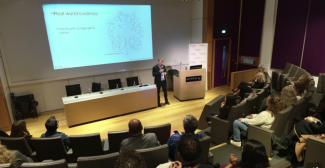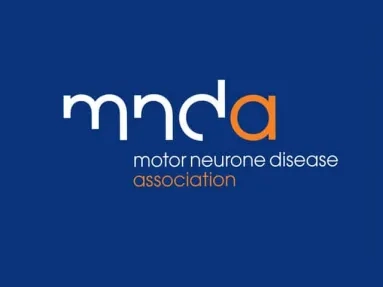The Annual Stephen Hawking MND Lectures were launched in 2017 – and are now an established and important part of the Association’s calendar.
The aim of the Annual Stephen Hawking MND Lecture is to bring current research in motor neurone disease to members of the multidisciplinary team and demonstrate how this might feed into their practice. Lectures are led by experts in their field, and these engaging and popular events attract hundreds of health and social care professionals, including delegates from across Europe. The lectures are held in the evening and online to make attendance as open as possible.
Our thanks to the Stephen Hawking Foundation for their funding support.
Watch the recording of the 2025 Annual Stephen Hawking MND Lecture:
The genetics of motor neurone disease: why does genetics matter for people living with MND?
On 4 November, we hosted the 8th Annual Stephen Hawking MND Lecture, delivered by Professor Ammar Al-Chalabi, Professor of Neurology and Complex Disease Genetics.
His talk explored how genetic knowledge can help predict or diagnose the disease and shape treatments, and how you can discuss genetics-related decisions in everyday practice to support the people in your care.
The lecture was delivered as a hybrid event, with guests joining us in person in the magnificent surroundings of the Royal Society of Medicine in London and hundreds of people from all around the world watching the live stream.
Attendees who joined the event said:
"Always reassuring to hear and learn how much research is translating into clinical practice. Knowledge builds confidence in providing support and assurances to the people with MND."
"This year's speaker was truly outstanding. Genetics is complex, and it is even more so for a layperson. However, the speaker made the subject much more accessible."
"I'm 4th generation of genetic MND, so this lecture was so important to me."
Previous lectures
You can watch videos of previous lectures below:
- 2024 The importance of psychological care: Acceptance and Commitment Therapy (ACT) - a proven intervention that supports quality of life
Professor Rebecca Gould, Professor of Psychological Therapies in the Division of Psychiatry at University College London, and an Honorary Clinical Psychologist at Camden and Islington NHS Foundation Trust - 2023 MND – Planning ahead for effective person-centred care
Bee Wee CBE, Consultant in Palliative Medicine at Sobell House and Katharine House Hospice, Oxford University Hospitals NHS Foundation Trust and Associate Professor at University of Oxford and Non Executive Director of the National Institute for Health and Care Excellence. - 2022 Communication in MND: How can we have better conversations?
Professor Steven Bloch, (PhD, MRCSLT, SFHEA), Professor of Communication and Social Interaction in the Division of Psychology and Language Sciences, and University College London, Vice Dean Education, Faculty of Brain Sciences, University College London. - 2021 MND - Delivering person centred care at end of life
Dr Idris Baker, Consultant in Palliative Care, Ty Olwen Hospice, Morriston Hospital, Swansea and National Clinical Lead for palliative and end of life care in Wales. - 2020 Effective MND respiratory care
Dr Rónan Astin BA Hons MRCP PhD Consultant in Respiratory and Ventilation Medicine, at University College London Hospital (UCLH). - 2019 Nutrition in MND – could getting it right make a difference?
Professor Christopher McDermott, (MBChB, FRCP, PhD) Head of Department and Professor of Translational Neurology, Sheffield Institute for Translational Neuroscience (SITraN). - 2018 Cognitive and behavioural symptoms in MND: defining the Amyotrophic Lateral Sclerosis Frontotemporal Dementia (ALSFTD) spectrum
Professor Eneida Mioshi, Chair of Dementia Care, School of Health Sciences, University of East Anglia.




